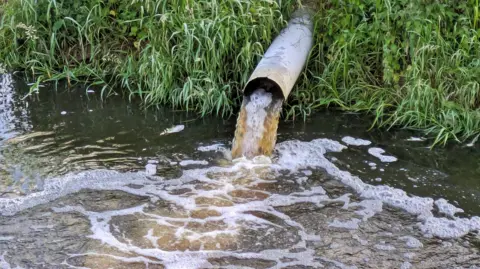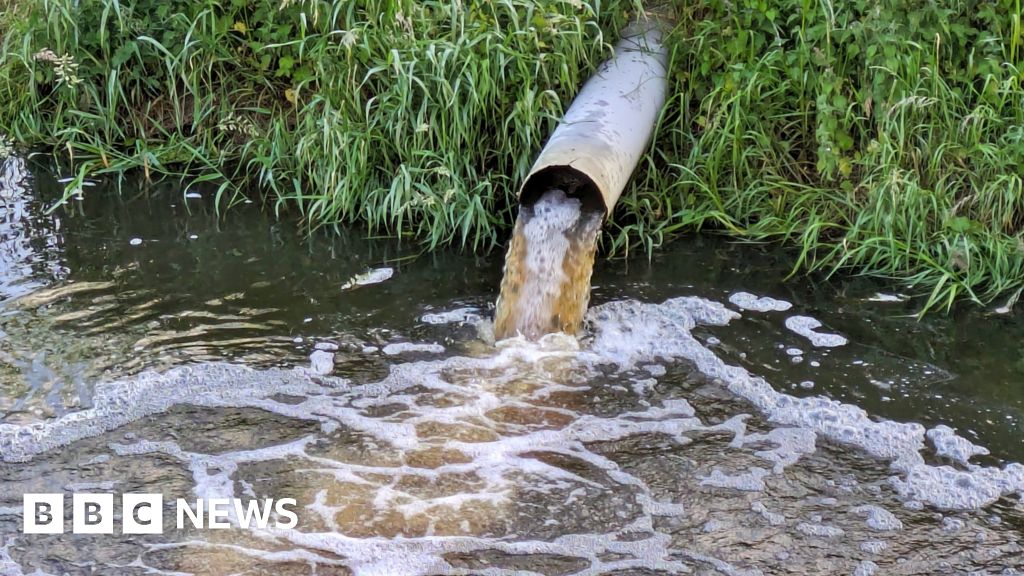BBC News
The number of times sewage is discharged by water companies will be halved by 2030, the environment secretary has pledged.
Steve Reed told the BBC’s Sunday with Laura Kuenssberg that people were “furious” about the “broken” state of the water sector, and that they could judge him at the next election if he had not overseen an improvement.
Serious pollution incidents by water companies in England rose by 60% in 2024 to the highest number on record, data published by the Environment Agency on Friday shows.
It marks the first time the government has set a clear target on the number of pollution spills, following public outcry over the state of the UK’s waterways.
Reed said he had spoken to people “up and down the country” who were “furious about the state of our water”.
He told Laura Kuenssberg that he would be held accountable if there had not been improvements in water quality by the next election.
“Politicians come and say we’re going to do things. Of course our job should be on the line if we don’t,” he said.
There has been widespread scrutiny of water companies over the increasing number of sewage discharges into UK waterways amid rising bills – all while the firms paid out millions to executives and shareholders.
The Environment Agency said water companies recorded 2,801 pollution incidents in 2024, up from 2,174 in 2023.
Of those, 75 were considered to pose “serious or persistent” harm to fisheries, drinking water and human health – up from 47 in the year previous.
A landmark review of the industry by the Water Commission is due on Monday, which could include a recommendation to scrap the sector’s regulator Ofwat.
Reed said Ofwat was “clearly failing” and that “regulation must change” – but did not say whether it would be shuttered.
The environment secretary added that he had been given the commission’s report but had not yet had time to read it thoroughly.
 Getty Images
Getty ImagesWhile the number of discharges rose last year, water bosses in England were paid £7.6m in bonuses, according to the government. In June, it barred bonus payouts at six firms that had failed environmental and consumer standards.
Reed said the extra £691,000 awarded to the boss of Southern Water, almost doubling his income, was “outrageous”.
He urged Southern’s boss to “think how this looks to their customers” and turn down the pay rise.
But Reed ruled out taking water companies back into public ownership, which he said would “take years” and be too expensive.
“Nationalisation would cost upwards of £100bn that we’d have to take away from the NHS and schools to give to the owners of the companies that are polluting.”
Victoria Atkins, Conservative MP and shadow secretary of state for environment, food and rural affairs, acknowledged that “more should have been done when we were in government”.
But she said Labour needed to be clearer about who was paying for the new investment the sector needed.
James Wallace, chief executive of charity River Action UK, said the target seemed “admirable” but was ultimately a “political pledge” instead of something legally binding.
Reed’s vow forms part of wider government plans to improve the water sector, including a commitment to work with devolved governments across the UK to ban wet wipes containing plastic, among other measures.
A record £104bn is due to be invested into the water sector over the next five years to improve its infrastructure.
As a result, consumer bills are expected to rise on average by £123 annually – though for Southern Water customers this could be as much as £224.
The Environment Agency has also received £189m to support hundreds of enforcement offices to inspect and prosecute water companies, with the fines retroactively paying for this.
England has a combined sewage system, which means both rainfall and sewage are processed through the same system. Last year, rainfall levels were up, which may have overwhelmed some ageing water company infrastructure.
But, despite variations in rainfall, discharges that result in serious pollution are a breach of companies’ permits and legal obligations.
Many incidents are reported to the Environment Agency by the companies themselves, but of 4,000 inspections carried out last year by the regulator, nearly a quarter of sites were in breach of their permits.
Nigel Farage, leader of Reform UK, said the water industry was a “hell of a mess” and should be brought into joint public-private ownership.
The state needed to get “some degree of control over vital national assets”, he said, but did not put a figure on its cost.
Liberal Democrat leader Ed Davey argued in favour of replacing Ofwat, and said public benefit corporations should take the place of private companies in running the UK’s water infrastructure.
(Except for the headline, this story has not been edited by PostX News and is published from a syndicated feed.)


